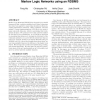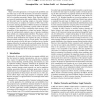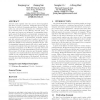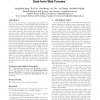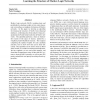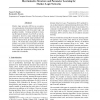144
click to vote
CORR
2011
Springer
14 years 9 months ago
2011
Springer
Markov Logic Networks (MLNs) have emerged as a powerful framework that combines statistical and logical reasoning; they have been applied to many data intensive problems including...
140
Voted
ICMLA
2009
14 years 12 months ago
2009
Languages that combine predicate logic with probabilities are needed to succinctly represent knowledge in many real-world domains. We consider a formalism based on universally qua...
120
click to vote
IJCAI
2007
15 years 3 months ago
2007
A formula in first-order logic can be viewed as a tree, with a logical connective at each node, and a knowledge base can be viewed as a tree whose root is a conjunction. Markov l...
136
Voted
ECAI
2008
Springer
15 years 3 months ago
2008
Springer
Many real-world applications of AI require both probability and first-order logic to deal with uncertainty and structural complexity. Logical AI has focused mainly on handling com...
140
Voted
FLAIRS
2008
15 years 4 months ago
2008
Combining probability and first-order logic has been the subject of intensive research during the last ten years. The most well-known formalisms combining probability and some sub...
129
Voted
AAAI
2008
15 years 4 months ago
2008
Markov logic networks (MLNs) combine first-order logic and Markov networks, allowing us to handle the complexity and uncertainty of real-world problems in a single consistent fram...
137
click to vote
KDD
2010
ACM
15 years 6 months ago
2010
ACM
Internet users regularly have the need to find biographies and facts of people of interest. Wikipedia has become the first stop for celebrity biographies and facts. However, Wik...
140
click to vote
WWW
2009
ACM
16 years 2 months ago
2009
ACM
Web forums have become an important data resource for many web applications, but extracting structured data from unstructured web forum pages is still a challenging task due to bo...
113
Voted
ICML
2005
IEEE
16 years 2 months ago
2005
IEEE
Markov logic networks (MLNs) combine logic and probability by attaching weights to first-order clauses, and viewing these as templates for features of Markov networks. In this pap...
116
Voted
ICML
2008
IEEE
16 years 2 months ago
2008
IEEE
